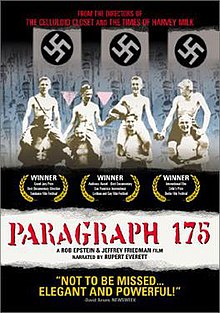Paragraph 175 (film)

Paragraph 175 is a documentary film released in 2000, directed by Rob Epstein and Jeffrey Friedman,[1] and narrated by Rupert Everett.[2] The film was produced by Rob Epstein, Jeffrey Friedman, Janet Cole, Michael Ehrenzweig, Sheila Nevins and Howard Rosenman. The film chronicles the lives of several gay men and one lesbian who were persecuted by the Nazis. The gay men were arrested by the Nazis for the crime of homosexuality under Paragraph 175, the sodomy provision of the German penal code, dating back to 1871. Between 1933 and 1945, 100,000 men were arrested under Paragraph 175. Some were imprisoned, others were sent to concentration camps. Only about 4,000 survived.
In 2000, fewer than ten of these men were known to be living. Five come forward in the documentary to tell their stories for the first time, considered to be among the last untold stories of the Third Reich.
Paragraph 175 tells of a gap in the historical record and reveals the lasting consequences, as told through personal stories of gay men and women who lived through it, including: Karl Gorath; Gad Beck, the half-Jewish resistance fighter who spent the war helping refugees escape Berlin; Annette Eick, a Jewish lesbian who escaped to England with the help of a woman she loved; Albrecht Becker, German Christian photographer, who was arrested and imprisoned for homosexuality, then joined the army on his release because he "wanted to be with men"; and Pierre Seel, the Alsatian teenager, who watched as his lover was eaten alive by dogs in the camps.
Awards
- Teddy Award for best documentary film, 2000[3]
See also
References
External links
- Paragraph 175 at IMDb
- NPR, All Things Considered - Rob Epstein remembers Pierre Seel - 2 December 2005 (audio file)
- 2000 films
- 2000 documentary films
- 2000 LGBT-related films
- Documentary films about LGBT topics
- Documentary films about the Holocaust
- Films directed by Jeffrey Friedman
- Films directed by Rob Epstein
- Persecution of homosexuals in Nazi Germany
- Sundance Film Festival award winners
- LGBTQ-related documentary film stubs
- Historical documentary film stubs
